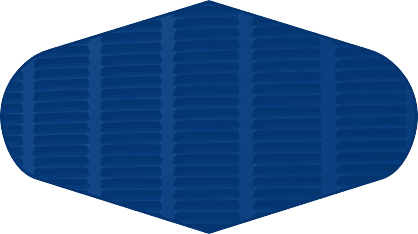Air filters are a vital part of any HVAC system. The filter’s primary purpose is to trap airborne particles to prevent them from possibly damaging your furnace, air handler and other HVAC equipment. However, there are also higher-rated filters that can trap bacteria, chemical pollutants and other airborne contaminants and thus improve indoor air quality. Most HVAC air filters are rated using the MERV (Minimum Efficiency Reporting Value) scale, but you can also find a number of HEPA (High-Efficiency Particulate Air) filters for use in certain situations. With this in mind, let’s take a look at the differences between the two to help you determine which filter is best for your HVAC system.
The MERV Rating System Explained
The MERV system rates air filters based on how effectively they can trap airborne particles of various sizes. At the lowest end of the scale are MERV 1 to MERV 4 filters, which are only effective at trapping the largest airborne particles such as dust and pollen. Most of these filters are designed for use in window AC units, but there are also a number of MERV 4 filters designed for residential HVAC systems.
At the highest end of the scale are MERV 16 filters, which are more than 95% effective at trapping much smaller particles like airborne gases, bacteria, smoke, exhaust fumes, etc. However, these are generally never used in residential HVAC systems. The reason is that this level of filtration drastically restricts the airflow, which means they can only be used with extremely powerful HVAC systems. This level of filtration is also overkill in most situations. In fact, even hospitals rarely use anything above a MERV 14 filter except in ICUs and some surgical rooms.
Most residential air filters will range between MERV 4 and MERV 12. For commercial HVAC systems, you can find filters that range anywhere from MERV 5 to MERV 16.
What Are HEPA Filters?
The MERV scale technically runs from 1 to 20. Anything above from MERV 17 to MERV 20 is considered a HEPA filter. You can find HEPA filters in some household appliances such as vacuum cleaners and portable air filtration systems. However, for HVAC systems, HEPA filters are generally only used in very specific situations. This includes pharmaceutical manufacturing, orthopedic surgery rooms and places that deal with carcinogenic or radioactive materials.
Choosing the Best Filter for Your HVAC System
When deciding what type of air filter to use in your HVAC system, it is important to consider your specific goal. If you’re merely looking to protect your HVAC equipment, anything from MERV 6 to MERV 8 will be more than sufficient. MERV 4 is generally the minimum you should ever use in a residential HVAC system, but most experts still recommend going with something rated slightly higher.
If you suffer from allergies or are concerned with the air quality inside your home, you may want to upgrade to something like a MERV 10 or MERV 12 filter. These will be far more effective at filtering out pollen, mold spores and other allergens and contaminants. Still, most residential HVAC systems won’t be able to handle anything above a MERV 12 filter. In fact, using too efficient of a filter can actually harm your HVAC system and force it to work much harder to keep your home heated and cooled. This can potentially lead to more frequent repairs and possibly shorten the lifespan of your HVAC equipment.
If you want to achieve a much higher level of filtration, you are much better off installing a separate air filtration system in your home. Most whole-home air filtration systems work in conjunction with your HVAC system to filter the air circulating through the home. Many of these systems use a MERV 15 or MERV 16 filter to provide the highest level of filtration available outside of using a true HEPA filter.
Experienced HVAC Experts
At Jco Heating A/C Electrical, we have two decades worth of experience providing professional HVAC services to customers in Springfield, OR and the surrounding areas. If you have any questions about which air filter is right for your HVAC system, our certified technicians are always on hand to advise you. We also offer numerous solutions that can help you improve your home’s indoor air quality including whole-home air filtration and purification systems. In addition, we provide a full range of cooling and heating services including repairs, maintenance and new equipment installations. Contact us today if you have any questions or would like to schedule an appointment!

 WE SERVICE ALL MAKES & MODELS
WE SERVICE ALL MAKES & MODELS